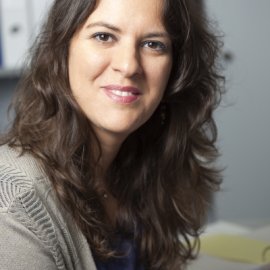Philosophy and History of Religions, LabeEx-HASTEC, Paris, France

Octobre 2013 à Juin 2014
Luciana Gabriela Soares Santoprete obtained her PhD at the École Pratique des Hautes Études (Religious Sciences Section, Paris, France), she is alumnus at Scuola Normale Superiore of Pisa (Italy) and at Universidade Federal do Rio de Janeiro (Brazil).
Former Research and Teaching Fellow (ATER) at École Pratique des Hautes Études (Religious Sciences Section) and at Collège de France (Institut for History of Oriental Christianities), she has been studying for many years the history of philosophy and ancient religious currents.
Research Associate at the Centre Jean Pépin (CNRS, Paris) since 2011, and at the Laboratory for Studies of Monotheisms (CNRS, Paris) since 2001, she was awarded in 2011 a postdoctoral fellowship at the European Excellence Lab of History and Anthropology of Knowledge, Techniques and Beliefs (LabEXHASTEC) in Paris.
Her research focuses on the debates in the fi rst centuries of our era between traditional philosophical schools and the Platonic and/or Platonizing philosophical and theological movements of the imperial era (Gnosticism, Hermeticism and the theological oracles, especially the Chaldean Oracles) considered as being on the margins of this tradition. It tends
to demonstrate the importance and the contribution of these currents inspired by Platonic thought for the development of the philosophical and religious tradition of Late Antiquity and provide a broader and more unitary vision of the history of Platonism.
the Platonisms of the Late Antiquity
This fellowship aims to develop and enlarge new scholarly research tools concerning the study of the relations between Plotinus and the Gnostics but also of the relations between the philosophical traditions of classical and late antiquity and the philosophico-religious currents at the beginning of the Christian era considered as being on the “margins” of this tradition, namely the Gnosticism, the Hermeticism and the theological oracles, especially the Chaldean Oracles.
These tools are a database on the vocabulary, doctrines, and existing bibliographies of the corpus of philosophical, Gnostic, Hermetic and Chaldean Oracles writings ; a bibliographical index of the relations between the philosophical, Gnostic, Hermetic and Chaldean traditions ; and a research blog that presents and discusses research projects, activities and scientific publications about the relations between traditional philosophical schools and the philosophical and theological movements of the Late Antiquity.
These research tools will allow preparing folders for each of these fields of study, including data and research ideas once scattered over introductions, notes and commentaries of translations and articles. They will facilitate the gathering of relevant works, the systematic exploration of thematic and lexical parallels between these bodies of thought, the analysis of principal terms and texts studied so far, therefore shading light on the originality or repetition of scholars’ arguments throughout the history of the respective fields, and the historical reasons for their approaches.
These research tools will thus provide an extensive and detailed ‘cartography’ of the history of scholarship on the links between the schools of philosophy and the Platonic and/or Platonizing philosophical and theological movements of the imperial era, which shows the importance of these marginal currents and the integration of this ‘underworld of Platonism’ to the so-called Platonic tradition, and opens new perspectives in understanding the history of ancient Platonism.
Furthermore, the methodology developed for the design of the database is highly original in the domain of digital humanities and could serve as a model for other similar databases in the arts and humanities.
This project, which is multidisciplinary and multilingual, involving several fields of research and different languages can also serve a broad public: students and historians of philosophy and religion of classical and late antiquity.
SOARES, Luciana. L’emploi du terme ‘??????????’ dans le grand traité antignostique de Plotin et dans les Oracles Chaldaïques. In TARDIEU Michel et SENG Helmut (ed.). Actes du Colloque International Die Chaldaeischen Orakel. Kontext – Interpretation – Rezeption, 2010, p. 163-178.
SOARES, Luciana. Primeiro repertório bibliográfico dos estudos em língua portuguesa dedicados ao Neoplatonismo da Antiguidade Tardia - Parte I : Histórico da pesquisa. Revista Archai: Revista de Estudos sobre as Origens do Pensamento Ocidental, juillet 2010, n° 5, p. 151-212.
SOARES, Luciana. La question de la localisation des intelligibles chez les philosophes païens des premiers siècles de l’ère chrétienne. In AMIR-MOEZZI M. A., DUBOIS J.-D., JULLIEN C. et JULIEN F. (ed.). Pensée grecque et Sagesses Orientales : Hommage à Michel Tardieu. 2009, p. 637-651. (coll. Bibliothèque de l’École des Hautes Études – Sciences Religieuses, vol. 142).